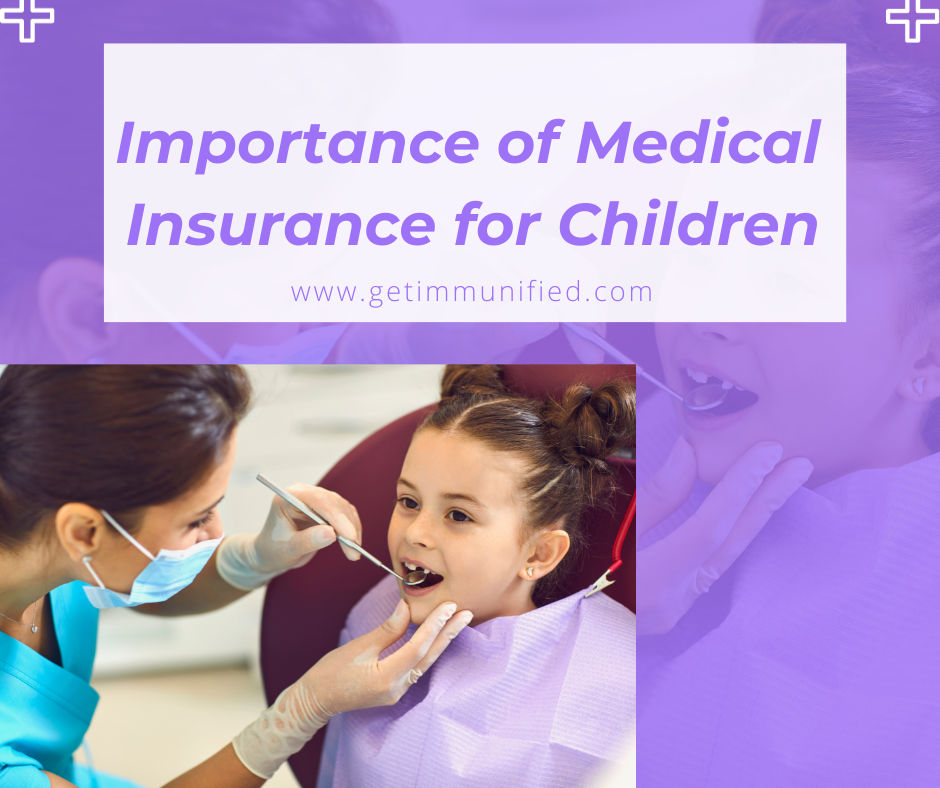Medical insurance for children is an important consideration for any family. According to the US Census Bureau, a government agency of the U.S. Federal Statistical System that is responsible for the publishing of data about the American people and economy, in 2021, around 26% of all children in the US were uninsured, and many more were underinsured.
You can see from the information above that there is a good percentage of uninsured children, and yours could be one of them.
So do you have any concerns about why you haven’t insured your child yet? It’s time to thrash them out and help you with every vital piece of information you may need concerning children’s medical insurance.
For a headstart, we’ve provided you with the importance of medical insurance for children. Check them out below.

Importance of Medical Insurance for Children
The following are the benefits of medical insurance for children:
- Children’s medical insurance ensures the kids have access to preventive care, such as immunization, well-child care, etc
- It covers the costs of treatment for illnesses and injuries
- To protect families from financial hardship if their child has a serious illness or injury
- This insurance ensures children have access to quality care when they need it
- To reduce the chances of developing chronic health conditions later in life.
Things Covered by Children’s Medical Insurance
Here is a list of the things that medical insurance for children covers:
- Well-child visits and immunizations
- Inpatient and outpatient hospital care
- X-rays, lab tests, and other diagnostic procedures
- Prescription drugs
- Mental health and behavioral health services
- Emergency care
- Some dental and vision care.
Factors to Consider When Purchasing Health Insurance Coverage for Your Kids
The following are the factors you need to take into consideration when purchasing your kid’s health insurance:
- Cost
- Coverage
- Network
- Flexibility
- Reputation of the insurance company
- Reviews and ratings from other customers
- Ease of use of the website or app
- Customer service.
Cost
You have to consider how much you can afford to pay each month and whether you can get financial assistance through the Affordable Care Act or other programs.
Some plans require you to make certain payments first before the insurance company takes over. So you must understand how these costs work and how much you’ll have to pay if you use your insurance.
Coverage
Coverage refers to the services, procedures, and treatments that your insurance plan covers. They include things like doctor visits, hospital stays, prescriptions, and more.
It’s important to note that not all health insurance plans cover the same things, and you may have to check with your specific plan to see what is and isn’t covered.
Network
This is one of the most important factors you need to pay attention to when it comes to health insurance.
A network is a group of doctors, hospitals, pharmacies, and other healthcare providers that have a contract with your insurer to provide care at a discounted rate.
So when you see an “in-network” doctor or provider, you’ll pay less out of pocket because the insurance company has negotiated a lower rate with them.
Flexibility
Health plans can range from very flexible, where you can see any doctor or hospital you want, to very limited, where you can only see a certain group of doctors or hospitals.
Plans that have more flexibility are usually more expensive, but they may be worth it if you want the freedom to choose your healthcare providers.
Whereas plans with less flexibility are typically more affordable, you may not have as much choice in who you see for your care.
Reputation of the Insurance Company
The reputation of an insurance company can be measured in a few different ways. One way is by looking at its financial strength.
A company with a strong financial rating is likely to be able to cover claims without issue. Another way to measure reputation is by looking at customer satisfaction.
This can be done by looking at customer reviews, surveys, and other forms of feedback.
Reviews and Ratings From Other Customers
That’s a great point to bring up. Customer reviews and ratings can be a valuable source of information when researching a health insurance company.
Sites like Trustpilot, the Better Business Bureau, and some others can be good places to start. It’s important to keep in mind that not all reviews will be positive, and a company with a few negative reviews may still be a good choice.
Ease of Use of The Website or App
A user-friendly website or app can make a big difference in the overall experience of using a health insurance plan.
For a website or app to be considered good, it has to at least be easy to navigate and provide clear information about coverage and costs.
Also, it should be easy to file claims, check balances, and view other important information. If a website or app is difficult to use, it can add more frustration and stress to the already complicated process of managing health insurance.
Customer Service
A good customer service team should be available to answer questions and provide help when needed.
They should be knowledgeable, friendly, and able to resolve issues promptly. It’s also helpful if they are available by phone, email, and live chat.
Types of Medical Insurance for Children
Below are the types of health insurance that are available for children:
- Family Floater Plans
- Individual Health Insurance
- Child-Only Plans
- Government Health Schemes
- Add-on Covers for Children.
Details on the Types of Children’s Health Insurance Plans
Family Floater Plans
Pros
- One policy covers the whole family
- Can be more affordable than purchasing individual policies
- Guaranteed issue, meaning anyone can purchase a policy.
Cons
- May not offer as much flexibility as individual policies
- This type of insurance may not cover certain types of expenses, like dental and vision care.
Description
A family floater plan is a type of health insurance policy that covers all members of a family under a single plan. It’s just like a canopy or an umbrella that covers your family.
With a family floater plan, each member of the family has the same sum insured, and any member can use the entire amount if needed.
This type of plan can be beneficial for families with children, as it allows them to have one plan that covers everyone rather than having separate policies for each person.
It can also be more cost-effective than buying individual policies for each family member.
Individual Health Insurance
Pros
- Individual policies can be customized to meet your specific needs
- Can offer more flexibility and choice when it comes to coverage and benefits.
Cons
- Can be more expensive than family floater plans
- It may be more difficult to manage multiple policies for each family member.
Description
Individual health insurance is a type of health insurance policy that covers a single person. This type of insurance can cover just your child, and it is designed specifically to meet his or her needs.
This type of policy is usually more expensive than a family floater plan, but it can be a good option to get it for your child
Child-Only Plans
Pros
- Can be more affordable than family floater plans
- It can cover pre-existing conditions.
Cons
- May not offer the same level of flexibility as individual policies
- It has age limits on coverage.
Description
The Affordable Care Act (ACA) regulates this insurance, such that the child-only plans cannot deny coverage to children with pre-existing conditions, and they can’t charge higher premiums based on health status.
Additionally, child-only plans are guaranteed, which means that insurance companies can’t deny coverage to children who apply for a policy.
Government Health Schemes
Pros
- It usually has lower premiums than private health insurance
- Usually covers pre-existing conditions.
Cons
- May have limited coverage compared to private insurance
- It’s not available in all areas
- May have restrictions on which providers can be used.
Description
Government health schemes, or government-sponsored health insurance, refer to programs like Medicaid and the Children’s Health Insurance Program (CHIP).
CHIP is a federal program that provides health coverage for children in families who earn too much money to qualify for Medicaid but can’t afford private insurance.
These programs are administered at the state level, so the eligibility requirements and benefits vary from state to state.
Add-on Covers for Children
Pros
- It covers costs that aren’t covered by the main health insurance policy
- Can provide extra protection in case of an emergency
- It’s more affordable than purchasing separate policies.
Cons
- May increase the cost of your overall health insurance policy
- This type of insurance usually has restrictions on what is covered.
Description
There are a few common add-ons that parents may want to consider when purchasing medical insurance for their children.
Some of these add-ons include dental, vision, hearing benefits, etc., and they can be added to a child’s health insurance policy for an additional cost.
Parents may also want to consider adding critical illness coverage, which provides a lump-sum payment if the child is diagnosed with a specific illness or condition.
FAQs on Types of Medical Insurance for Children
At what age can I get insurance for my child?
You can usually get insurance for your child as soon as they are born. Some policies may require that your child be at least 30 days old before they can get a policy. Other policies may have different age requirements, so it is important to check with your insurer. Overall, the minimum age for coverage will depend on the policy and the state you live in.
How long can my child stay on my policy?
Well, the answer to this question can vary depending on certain factors. Some policies will allow your child to stay on your policy until they are 26 years old. Other policies may have different age limits. For example, some states require insurers to offer coverage until the age of 30. To find out how long your child can stay on your policy, it is best to check with your insurer and your state insurance department.
Can I get insurance for my child if they have a pre-existing condition?
Yes, you can usually get insurance for your child, even if they have a pre-existing condition. However, it is important to note that some insurers may charge a higher premium for a child with a pre-existing condition.
Can my child have his own policy if he's a student?
Many insurance companies offer policies specifically designed for students. These policies may have lower premiums and may be tailored to meet the needs of students. In some cases, your child may be eligible for a student health plan through his school.
Can I add extra coverage for my child?
We Also Recommend:
- 15 Different Types of Commercial Property Insurance
- Medical Expenses That Are Tax-Deductible
- Types of Health Insurance In The USA
- 15 Best Medical Insurance in Kenya
- 8 Free Medical Insurance for Unemployed (Adults and Children).
Conclusion
Medical insurance for children is an important consideration for parents. It is important to understand the different types of policies available, the age requirements, and the availability of coverage for pre-existing conditions.
Also, it’s important to consider the cost of the policy and whether riders are available to add on extra coverage. Parents should work with their insurance company to find a policy that meets the needs of their child and their family.
